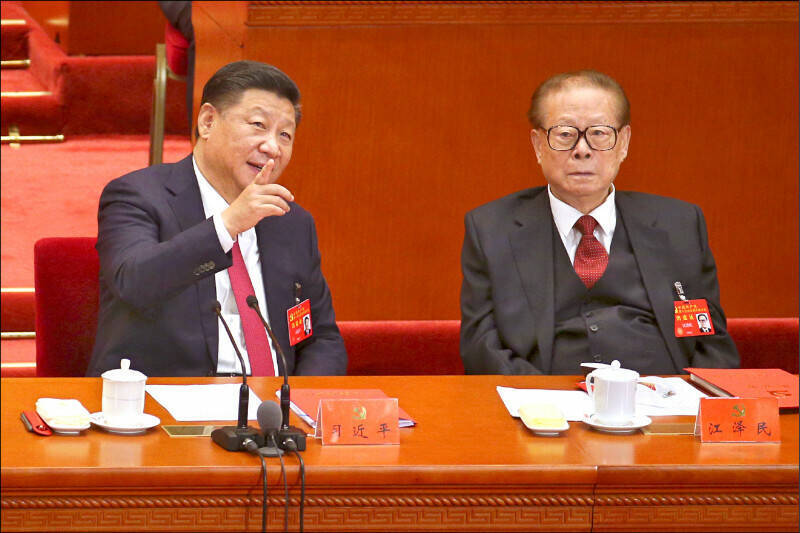Former Chinese President Jiang Zemin (right) died on November 30 at the age of 96.
The picture shows Chinese President Xi Jinping (left) talking with the elderly Jiang Zemin at the 19th National Congress of the Communist Party of China in 2017.
(European News Agency file photo)
[Reporter Chen Zhengyu/Taipei Report] Jiang Zemin, the third-generation leader of the CCP, passed away yesterday. Lin Junxian, a legislator of the Democratic Progressive Party, said that the timing of the news of Jiang Zemin’s death was a bit of a coincidence. Hu Yaobang rose up; Jiang's greatest contribution to China was to establish the line of "making a fortune in silence" and "not striving for hegemony", allowing China to accumulate its current strength, but it was completely defeated by the current general secretary of the Communist Party of China, Xi Jinping.
At the time when the "blank paper revolution" broke out in many places in China because the people were tired of the strict epidemic prevention restrictions, 96-year-old Jiang Zemin was reported to have died of leukemia at 12:13 noon yesterday in Shanghai due to multiple organ failure. , shocked all walks of life.
However, as early as the 13th of this month, Chinese media person Qin Feng posted a post on Weibo, "The river is flowing eastward", which aroused many speculations at that time.
Please read on...
Regarding the timing of Jiang Zemin's death, Lin Junxian questioned it on Facebook last night. The news of Jiang Zemin's death suddenly came out yesterday afternoon. Although it is not surprising that he was 96 years old, the timing is really a coincidence. Street demonstrations and the death of the former leader, why does this script seem to have been acted out?
Because the June 4 incident 33 years ago was launched precisely to commemorate Hu Yaobang, "Will the ongoing demonstrations be expanded in the name of mourning, and history will eventually repeat itself?"
Lin Junxian said that as early as mid-November, the news of Jiang Zemin's death had already started to spread on the Chinese Internet, but because there were too many similar messages in the past, they were not noticed. "I didn't expect it to be true this time."
In recent years, many Chinese people have begun to miss Jiang Zemin. Although there are still many controversies during his tenure, there is no harm if there is no comparison, because the 20 years of Jiang Zemin and Hu Jintao's reign are indeed the freest political and social atmosphere in modern Chinese history. During the period, no one expected that Xi Jinping would "reverse the car" to such an extent.
Looking back on history, Lin Junxian pointed out that the June 4 incident was not caused overnight, but the social energy that gradually accumulated after the reformists came to power at the end of the Cultural Revolution. The "86 student movement" before that was the key. The student movement made the veterans of the CCP extremely dissatisfied and fought against Hu Yaobang. The conflict finally exploded in 1989 because of Hu Yaobang's death.
Whether the current "blank paper revolution" will have a similar trend because of Jiang Zemin's death, and whether mourning activities will be banned by the CCP are the biggest things to watch next.
Lin Junxian believes that Jiang Zemin's greatest contribution to China is to establish the line of "making a fortune in silence" and "not seeking hegemony", so that China can accumulate its current strength, but this is the biggest flaw of the dictatorship system. A prodigal son like Xi Jinping ruined it all, and in the end everything went back to the original point.
The political reforms that were not achieved in the 1980s will eventually have to be faced, and everything still depends on whether the Chinese people themselves have such determination.
